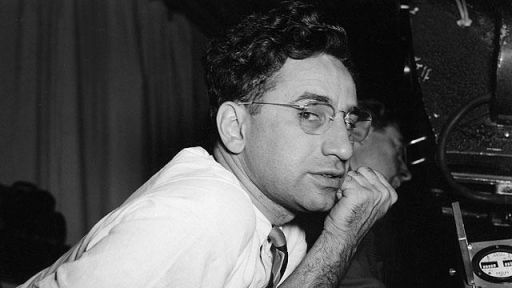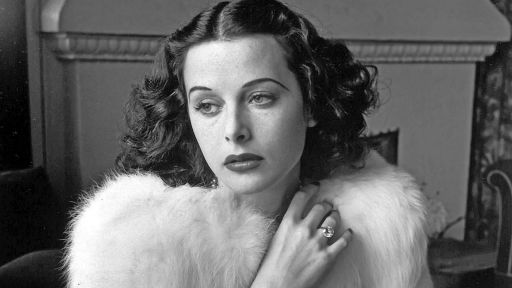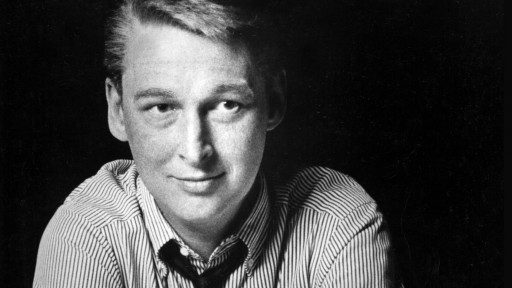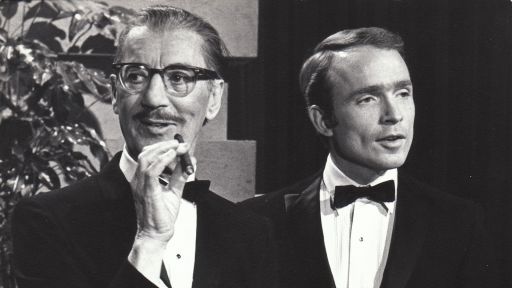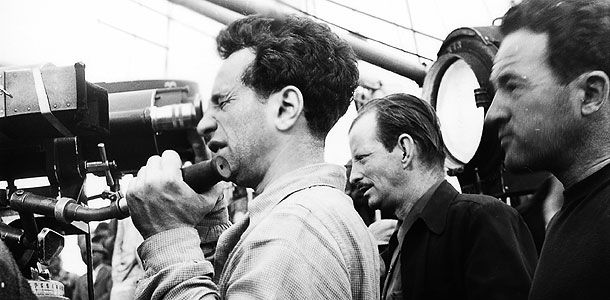
“Panic in the Streets” c. 1950 Twentieth Century Fox Film Corporation. Renewed c. 1977 Twentieth Century Fox Film Corporation. All Rights Reserved.
On March 21, 1999, and for the first time in its long and illustrious history, the Academy Awards® ceremony occurred on a Sunday. Over 45 million people watched on television. While glamorous nominees and other Hollywood elites walked the fabled red carpet into L.A.’s Dorothy Chandler Pavilion, perhaps the most accomplished and influential attendee entered discreetly through a back door.
Introduced by one of the greatest actors of our time, Robert De Niro, and one of the greatest directors of our time, Martin Scorsese, one of the greatest directors of all time prepared to return to the OSCAR® stage to receive the iconic gold statuette for the first time since 1954. After a video retrospective featuring the man and his work, Elia Kazan was escorted onto the stage by his wife, Frances, to receive an honorary OSCAR® recognizing and celebrating his lifetime of extraordinary achievement in film.
Not everyone applauded. Even fewer rose to their feet. But the ovation lasted for nearly a full minute—an eternity in an OSCARS® television broadcast. Although his history was controversial and his relationship with Hollywood was at times ambivalent, no one could deny the genius of his visionary and influential body of work in film. Kazan graciously thanked the Academy of Motion Picture Arts and Sciences for its courage and generosity in bestowing such an honor. He embraced an emotional Scorsese and DeNiro, then humbly concluded, “I think I could just slip away.”
Kazan the honoree was not always so reserved and retiring. Elia Kazan the director bravely and artfully confronted some of the more pressing social issues of his time: topics such as class division, bigotry and corruption. His courage and talent behind the camera delivered some of Hollywood’s most unforgettable cinematic achievements, such as A Streetcar Named Desire (1951), On the Waterfront (1954) and East of Eden (1955). His leadership and tutelage elicited OSCAR®-Winning performances from screen greats such as Vivien Leigh, Anthony Quinn, Marlon Brando and Eva Marie Saint.
Elia Kazan was born Elias Kazancoglu in 1909 to Greek parents living in Turkey. His family emigrated to New York City in 1913. Although there were expectations that he would join the family rug business, his heart was set on theater. Kazan graduated from Williams College, then attended the School of Drama at Yale University.
Following his education, Kazan entered the world of theater in New York. He began as an actor, appearing in stage productions such as Golden Boy and Men in White. He quickly earned a reputation as a reliable jack-of-all-trades, earning the nickname “Gadge” (short for gadget). Kazan eventually earned the opportunity to direct.
On stage, he brought to life the works of some of America’s greatest playwrights, including Tennessee Williams (A Streetcar Named Desire, Cat on a Hot Tin Roof) and Arthur Miller (All My Sons, Death of a Salesman). The latter two productions earned Kazan Tony Awards® for Best Direction (1947) and Best Director (1949), respectively. Kazan also won a Tony® for Best Direction in 1959 for his work on J.B.
The gifted Kazan was discovered by Hollywood early in his career. He executive produced and appeared as an actor in 1935’s Pie in the Sky. Kazan moved behind the camera to serve as an assistant director on the 1937 short subject People of the Cumberland. His education in film continued when he was cast in the role of “Googi” in the 1940 James Cagney vehicle City for Conquest. Kazan took particular note of Cagney’s acting technique and his rapport with the cast and crew.
Kazan’s unique experience, talent and versatility earned him a contract with Twentieth Century Fox in 1944 to direct five films in five years. His first outing proved that the studio made the right choice. Kazan’s direction of the 1945 adaptation of the beloved Betty Smith novel A Tree Grows in Brooklyn was a critical success and an instant classic. Kazan’s natural ability to summon great performances from his cast was fast becoming his trademark—James Dunn won the 1945 ACADEMY AWARD® for Best Supporting Actor, and Peggy Ann Garner won an OSCAR® for Outstanding Child Actress (a Special Award at the time, for which she was bestowed a miniature statuette).
The 1945 film The Sea of Grass gave Kazan the opportunity to direct silver-screen heavyweights Spencer Tracy and Katharine Hepburn. Kazan, however, was disappointed with his sophomore directing effort. Kazan bounced back in 1947 with the fact-based murder drama Boomerang, earning him Best Director awards from both the National Board of Review and the New York Film Critics Circle. Kazan’s profile continued to rise in Hollywood. Fox’s 1947 film Gentleman’s Agreement — a controversial study of anti-Semitism — earned Kazan his first ACADEMY AWARD® Best Directing Nomination and Win. His triumph would turn out to be bittersweet. The politically sensitive nature of Gentleman’s Agreement also garnered the unwanted attention of the U.S. Congress and its House Un-American Activities Committee (HUAC).
In 1952, after initially refusing to testify, Kazan appeared before the HUAC (not to be confused with the U.S. Senate counterpart led by Joseph R. McCarthy). Kazan had briefly been a member of the Communist Party of the United States of America in the mid-1930s. While questioned under oath, Kazan reluctantly identified people in the worlds of both theater and film—and most ended up blacklisted in Hollywood. Torn between his principles and personal loyalties, Kazan made a difficult and lonely decision to speak truthfully rather than to protect his friends and their careers. Many would never forgive Kazan. Others, in time, would come to respect him not only for his undisputed cinematic talent, but also for his honesty and integrity.
Excruciating moral dilemmas also punctuated many stories Kazan told from behind the camera. His fearless honesty, profound vision and innovative aesthetics led to ACADEMY AWARD® Best Directing Nominations for A Streetcar Named Desire (1951), East of Eden (1955) and America America (1963), also earning Kazan nominations for Best Picture and Best Adapted Screenplay. Most notably, Kazan again took home the Best Director OSCAR® in 1954 for On the Waterfront, a singular masterpiece earning twelve ACADEMY AWARD® Nominations, which culminated in eight OSCAR® Wins, including Best Picture. This Kazan classic would be cherished and honored for years to come. In 1989, On the Waterfront was selected for preservation in the United States National Film Registry for being “culturally, historically or aesthetically significant” as deemed by the United States Library of Congress.
In a twist of personal irony, the story in On the Waterfront culminates in longshoreman Terry Malloy’s (Marlon Brando, Best Actor Winner) moral dilemma as to whether he should give testimony against a powerful and crooked union boss (Lee J. Cobb, nominated Best Supporting Actor), who is connected with his [Malloy’s] attorney brother (Rod Steiger, nominated Best Supporting Actor). Perhaps it was Kazan’s own difficult decision to finally relent to the HUAC and give his own testimony that gave him the unique perspective and impetus to evoke landmark performances that earned OSCAR® Wins or Nominations for not only Brando, Cobb and Steiger, but also for Karl Malden and Eva Marie Saint (Winner, Best Supporting Actress).
Kazan’s remarkable work continued through the 1950s, ‘60s and ‘70s. Under his direction, films such as John Steinbeck’s classic tale East of Eden (1955), the provocative Baby Doll (1956), the revealing Splendor in the Grass (1961) and his very personal America America (1963, loosely based on his uncle’s life) earned additional OSCAR® Nominations and Wins for others affiliated with Kazan’s work. His final film was an adaptation of F. Scott Fitzgerald’s unfinished novel The Last Tycoon (1976), starring Robert DeNiro.
Scorsese and DeNiro proudly stood behind Kazan while he faced a theater full of grateful admirers and unforgiving detractors on that memorable Sunday in 1999.
Solemnly holding his third and final ACADEMY AWARD®, Elia Kazan personified the conflicted, controversial and principled outsider who often underscored the allure and cultural significance of his many films. He may have then openly wished to “just slip away,” but the cinematic treasures he left us ensure that he will forever be first remembered as a man of remarkable gifts and accomplishments during a truly golden era of Hollywood. Elia Kazan passed away on September 28, 2003.


